- 1. Email address check
- 2. Random password generator
- 3. Get IP address
- 4. XSL transformation
- 5. Force downloading of a file
- 6. String encoding to prevent harmful code
- 7. Sending mail
- 8. Uploading of files
- 9. List files in directory
- 10. Querying RDBMS with MDB2 (for e.g MySQL)
- Frequently Asked Questions (FAQs) about PHP Code Snippets
The list below is a compilation of list of some useful code snippets which might help you when writing your awesome PHP scripts. Also: See more PHP Scripts
1. Email address check
The aim of this project is to create an email address validation class (or function) that checks for technical validity1 in email addresses, the idea being then that a site can send an email to that address to verify ownership. Source
Source
2. Random password generator
Is a complete, working random password generation function for PHP. It allows the developer to customize the password: set its length and strength. Just include this function anywhere in your code and then use it.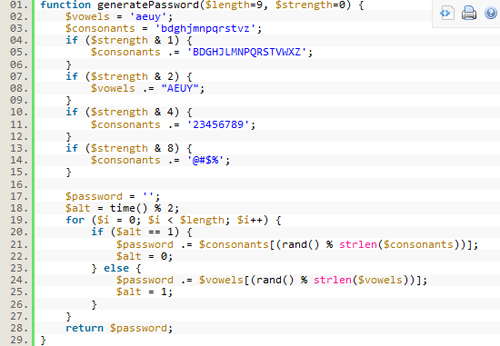 Source
Source
3. Get IP address
Returns the real IP address of a visitor, even when connecting via a proxy.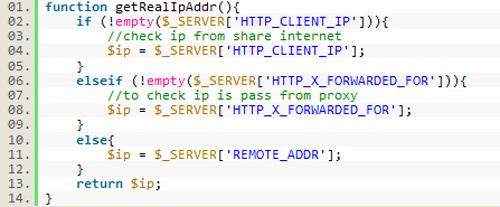 Source
Source
4. XSL transformation
This tutorial is for developers who wish to know how to generate HTML documents using a combination of XML data and XSL stylesheets. PHP5 version.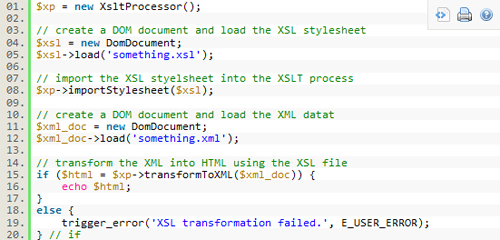 Source
Source
5. Force downloading of a file
Forces a user to download a file, for e.g you has an image but you want the user to download it instead of displaying it in his browser. Source
Source
6. String encoding to prevent harmful code
Web applications face any number of threats; one of them is cross-site scripting and related injection attacks. The Reform library attempts to provide a solid set of functions for encoding output for the most common context targets in web applications (e.g. HTML, XML, JavaScript, etc) Source
Source
7. Sending mail
Using PHPMailer. PHPMailer a powerful email transport class with a big features and small footprint that is simple to use and integrate into your own software.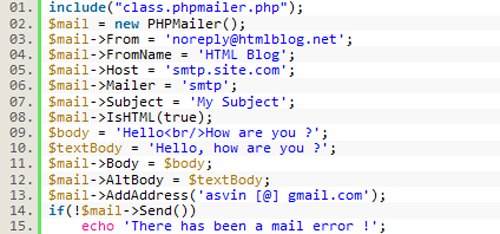 Source
Source
8. Uploading of files
Using class.upload.php from Colin Verot.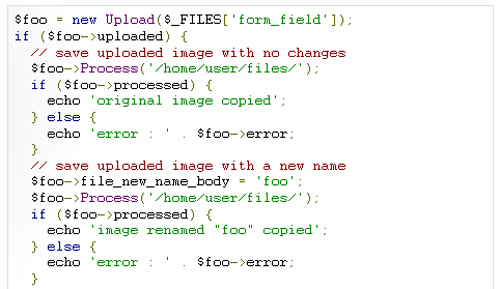 Source
Source
9. List files in directory
List all files in a directory and return an array.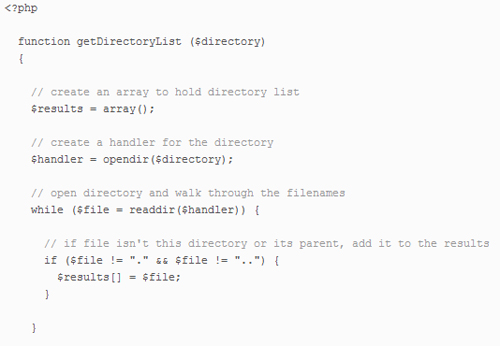 Source
Source
10. Querying RDBMS with MDB2 (for e.g MySQL)
PEAR MDB2 provides a common API for all supported RDBMS.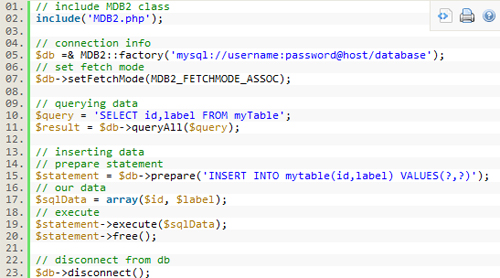 Source
Source
Frequently Asked Questions (FAQs) about PHP Code Snippets
What are PHP code snippets and why are they important?
PHP code snippets are small blocks of reusable code that can be inserted into larger programs. They are important because they save time and effort by providing pre-written solutions to common programming tasks. They also promote consistency and reduce errors, as the same code doesn’t have to be written multiple times.
How can I use PHP code snippets in my projects?
To use a PHP code snippet, you simply need to copy the code and paste it into your PHP file at the appropriate location. You may need to modify the code slightly to fit your specific needs, such as changing variable names or adjusting logic.
Can I create my own PHP code snippets?
Yes, you can create your own PHP code snippets. If you find yourself frequently writing the same code, it may be beneficial to turn it into a snippet for future use. Just ensure that the code is well-written and thoroughly tested before reusing it.
Are there any risks associated with using PHP code snippets?
While PHP code snippets can be very helpful, they can also pose risks if not used properly. For example, if a snippet contains errors or security vulnerabilities, these issues will be introduced into your project. Always review and test any code snippets before using them.
What is the best way to organize my PHP code snippets?
There are many ways to organize PHP code snippets, and the best method depends on your personal preferences and the complexity of your projects. Some developers prefer to keep a library of snippets in a separate file or directory, while others use specialized software or online services to manage their snippets.
Can I share my PHP code snippets with others?
Yes, sharing PHP code snippets is a great way to contribute to the developer community. You can share your snippets on your own website, on code sharing platforms, or through social media. Just make sure that your code is well-documented so others can understand how to use it.
How can I find PHP code snippets for specific tasks?
There are many resources available for finding PHP code snippets. You can search online code repositories, developer forums, and blogs. You can also use code snippet plugins for popular text editors, which often include a searchable database of snippets.
Can PHP code snippets be used with other programming languages?
PHP code snippets are specific to the PHP language and cannot be directly used in other languages. However, the concepts and logic in a PHP snippet may be applicable to other languages, and the code can often be translated with some modifications.
How can I improve my skills in using PHP code snippets?
The best way to improve your skills is through practice. Try using PHP code snippets in your projects, and experiment with modifying and creating your own snippets. You can also learn from other developers by studying their code snippets and understanding how they solve problems.
Are there any best practices for using PHP code snippets?
Some best practices for using PHP code snippets include understanding the code before using it, testing the snippet thoroughly, and properly documenting the code. It’s also important to respect the licensing terms of any snippets you use, especially if they were created by someone else.
 Sam Deering
Sam DeeringSam Deering has 15+ years of programming and website development experience. He was a website consultant at Console, ABC News, Flight Centre, Sapient Nitro, and the QLD Government and runs a tech blog with over 1 million views per month. Currently, Sam is the Founder of Crypto News, Australia.


